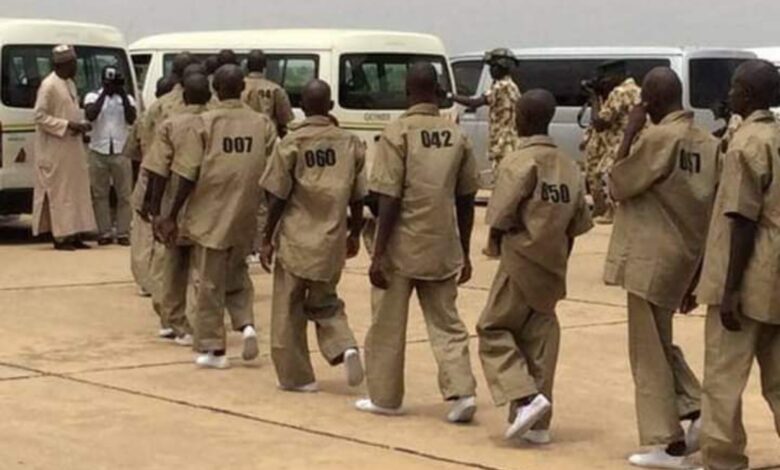Uproar At Holding Pen For Surrendered Boko Haram Terrorists Triggered By ‘Poor Planning’
Hundreds of surrendered Boko Haram fighters protested the slow pace of their reintegration into society in Maiduguri, Borno State, by barricading the main highway into the city, sparking fear amongst residents.

A recent uproar at a holding facility for repentant Boko Haram fighters in Maiduguri, the Borno state capital, was triggered by poor planning and organisation on behalf of the authorities managing the process, HumAngle understands.
The incident, which occurred on Friday August 18, disrupted the ongoing biometric data capture of the repentant fighters, leading to a temporary halt in the process. It has drawn attention to the complexities of reintegrating former insurgents into society.
The situation escalated quickly, with hundreds of ex-Boko Haram members barricading the main highway into Maiduguri, chanting slogans in apparent frustration with the government’s handling of their reintegration.
The breakdown in order happened after hundreds of surrendered former terrorists were placed in a holding camp for several days, apparently without adequate shelter and food, people who are familiar with the situation said.
The Borno State Government, under the multi-agency framework of Disarmament, Demobilisation, Deradicalisation, Rehabilitation, Reconciliation, and Reintegration (DDDRRR), or the “Borno Model,” is currently processing 6,900 repentant insurgents.
The biometric data capture, a crucial part of this process, is being conducted by a certified team of intelligence and ICT experts in six batches.
The process requires moving people to the place where their fingerprints and other identifying information is to be recorded and stored on a database.
However, a communication breakdown led to many of the repentant fighters arriving for the data capture later than scheduled, causing confusion and disruption at the camp where the exercise was conducted, HumAngle understands.
The Borno State Commissioner for Information and Internal Security, Prof Usman A Tar, in a statement, assured the public that normalcy had been restored at the venue of the biometric exercise. He explained that the biometric data capture resumed after the incident, with the “utmost level of professionalism and confidentiality in data management.”
Before the Commissioner’s statement, reports had reached reporters of the ex-insurgents’ protest, causing widespread panic among residents along the axis. The men, once feared for their ruthless acts, had seemingly gone berserk, leading to a scramble for safety.
People in charge of the process told HumAngle that the ex-terrorists were expressing their frustration with the slow process of biometric data capturing. The delays led most of them to go hungry because provision had not been made to feed that many people for that long.
The former terrorists were brought into Maiduguri from Bama, where most dwelled after their release during their gradual reintegration into society.
The move to get the complete data of the former terrorists was initiated by the Presidential Committee on Repentant Boko Haram, headed by the office of the Vice President, to ensure the 6,900 ex-fighters were appropriately profiled and their biometric details captured for further “strategic positive engagement” in future.
“They arrived in Maiduguri early last week, but up till Friday, the majority of them could not get done with the exercise as they had to pass nights in the open and hungry because the process of the biometric data capturing was slow,” a source familiar with the development said.
“Many of them became angry and decided to go to the middle of the highway to demonstrate their resentment,” the source said.
The incident raises questions about how such an exercise could have been better planned and executed to prevent such occurrences. Experts suggest that a more efficient data-capturing process, coupled with better communication and logistics, could have mitigated the situation.
“Providing adequate accommodation and food for the ex-insurgents during the process could have also helped to prevent the protest,” said a top civil servant who asked not to be identified as he was not cleared to speak on the matter.
“Furthermore, the government could have engaged the ex-fighters in dialogue to address their concerns and frustrations. This would not only have helped to prevent the protest but also fostered a sense of inclusion and respect among the ex-insurgents, who are still struggling to reintegrate into society.”
The incident in Maiduguri is a reminder of the challenges of reintegrating former insurgents into society. While the Borno State Government is to be commended for its efforts to rehabilitate and reintegrate these fighters, it is clear that more needs to be done to ensure that they are successfully reintegrated into society.
Support Our Journalism
There are millions of ordinary people affected by conflict in Africa whose stories are missing in the mainstream media. HumAngle is determined to tell those challenging and under-reported stories, hoping that the people impacted by these conflicts will find the safety and security they deserve.
To ensure that we continue to provide public service coverage, we have a small favour to ask you. We want you to be part of our journalistic endeavour by contributing a token to us.
Your donation will further promote a robust, free, and independent media.
Donate HereStay Closer To The Stories That Matter




